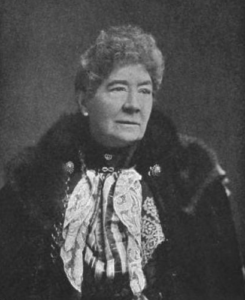by James Scott Bell
@jamesscottbell

Louisa Parr (1848 – 1903), via Wikipedia
I’m a fan of Gutenberg.org, which comes out with digitized versions of public domain works every day. I get their alerts, and the other day was interested to see On The Art of Writing Fiction, published in 1894.
It’s a series of chapters written by various authors, one of whom was Louisa Parr, an English novelist of some repute. I found her advice rather contemporary. Here is some of it:
To start, then, we will suppose that you are the possessor of a story which for some time has dwelt in your mind, and has taken such a hold of you, that you are engrossed with the plot and the actors in it. These creatures of your brain become so familiar to you, that they stand out in your imagination like real persons. You give them names, you invest them with qualities, you decree that they shall be happy or miserable, and, having sealed their fate, you are seized with the desire to make others acquainted with them.
Here Mrs. Parr advises the writer not sit down to write a novel until “possessed” of the potential story. That means both plot and characters, to the extent that you are “seized” by the desire to bring both alive on the page. I think she’s on to something. Unless and until you are “possessed” or “seized” by the story possibilities, you’re not going to bring anything original or vital to the page.
For some of us, setting out to write without a plan often leads to that state of possession—and should, if we’re to keep on going. For others, myself included, a time of brainstorming and writing a “white hot” document gets us to that place faster. It may also tell us we’re not ready to start that novel (without writing 20k words first).
Too frequently the young writer is not content to set down what is to be said with the straightforward simplicity that would be used if this story had to be told vivâ voce. There is a desire to explain, to digress, to elaborate. It is thought necessary to tell the reader that this person is very clever and witty, that that one is stupid and odious, much in the same way that a child draws some strange creature, under which it writes, “this is a cow—this is a horse.” We smile at its being necessary to inform us of what we ought to see for ourselves. Yet it is the same in fiction—the dramatis personæ of your tale should themselves discover to us their idiosyncrasies, and by their actions and conversation reveal to the reader their dispositions and characters.
This is great and modern advice, such as we dispense on TKZ frequently in our first-page critiques. It’s warning against the dreaded info dump. Better to “act first, explain later.”
Starting with the supposition that you have well thought out your plot, have conceived your characters, and some of the situations in which they are to be placed, my advice is that you endeavour to give a graphic relation of your story in words to a friend, so that you may hear how the arrangement of the incidents and events stand…
Interesting! A bit of market research to see if you’ve got enough for a complete story. When I was in film school the writer-director Paul Schrader came up for a lecture, and told us would-be screenwriters to gather some friends, make them spaghetti, then tell them your story and see if their “butts start to move” (meaning, they’re getting bored). I’ve never tried this because I don’t like talking about my story-in-progress with anyone. That’s why I’ve never been in a critique group. But I’m not dead set against them, either. What do you think?
About the length of a novel it is best that you should not trouble. When you feel that you have told all you have to tell, the book should come to an end. New pens should know nothing of padding, which is distasteful to every good writer and reader.
Hey, sounds like the discussion we recently had here.
If you are a true author your creation will have become very dear to you, and in launching it into the world you will suffer a hundred hopes and fears, and, perhaps, disappointments.
We’ve all been there! She ends with this:
The clouds of distrust are certain to cast their shadows over you, but if you have the assurance that you have spared no pains, that you have given your best, do not fear that they will overwhelm you; there is a moral satisfaction in having done good work which no one can rob us of.
There really is “moral satisfaction” in knowing you’ve done the best you can with what you have (this was the legendary basketball coach John Wooden’s definition of success).
I’ve never quite bought the idea of “Do what you love, the money will follow.” Rather, if you love what you do and work at it, day by day (and when you love it, such work is fun and satisfying) then the dough will rise. Maybe not enough to buy a yacht, but surely enough to fund a latte habit and a buy some writing books.
Comments welcome.
